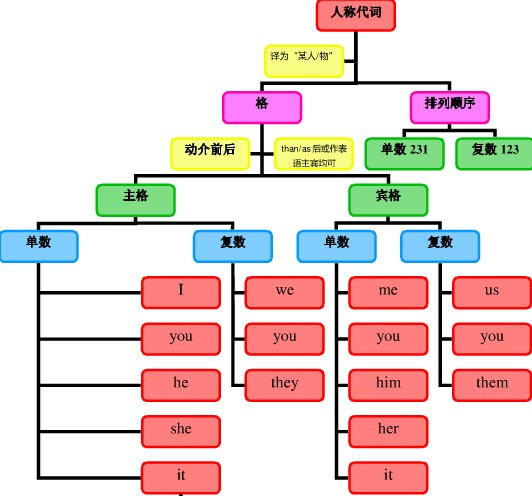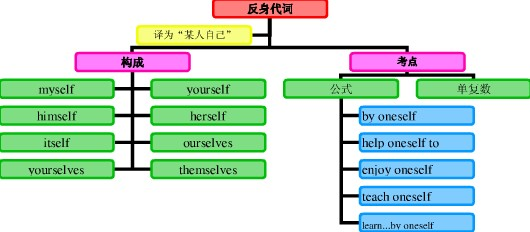本试题 “Catherine bought a postcard of the place she was visiting, addressed________to_________and then posted it at the nearby post office.[ ]A. it ; herB...” 主要考查您对人称代词
反身代词
等考点的理解。关于这些考点您可以点击下面的选项卡查看详细档案。
- 人称代词
- 反身代词
人称代词的概念:
人称代词是替代我、你、他、她、它、我们、你们、他们、她们、它们等人称的词。
人称代词分为主格和宾格形式,并有人称的单复数形式。按所替代人称的不同分为第一人称、第二人称和第三人称。
人称代词的用法:
人称代词在句中可以用作主语(用主格,如:I,you,he,she,we,they,等)和宾语(用宾格,如 me,you,him,her,us,them等)
如:He loves her, but she hates him. 他爱她,但她却讨厌他。
注:(1)在口语中,当人称代词用作表语、用于than, as之后或用于强调句中被强调时,可以用语。 例如:
"Who is it?" "It's me."“是谁呀?”“是我。”
He sings better than me. 他比我唱得好。
He is as tall as her. 他和她一样高。
It's me who did it. 这是我干的。但是,若than,as后的人称代词后跟有动词,则必须用主格。例如:
He sings better than I do./ He is as tall as she is.
(2)单独使用的人称代词通常用宾格。
"I' m tired.""Me too."“我累了。”“我也累了。”
"Who wants this?" "Me."“谁要这个?”“我要。”
(3)有时用主格或宾格会导致意思的变化。
I like you better than he. 我比他更喜欢你。为 I like you better than he likes you. 之略。
I like you better than him. 我喜欢你胜过喜欢他。为 I like you better than he likes him. 之略。
人称代词主格、宾格、人称、单复数对比:
|
人称代词 |
单数 |
复数 | ||
|
主格 |
宾格 |
主格 |
宾格 | |
|
第一人称 |
I |
me |
we |
us |
|
第二人称 |
you |
you |
you |
you |
|
第三人称 |
he |
him |
they |
them |
|
she |
her |
them | ||
|
it |
it | |||
人称代词的排序:
人称代词的排列顺序为:单数人称代词通常按“二三一”排列,即you, he and I;复数人称代词通常按“一二三”排列,即we, you and they:
You, he and I are of the same age. 你,他和我都是同一年龄。
We, you and they are all good citizens. 我们,你们和他们都是好公民。
但若是用于承担责任或错误等场合,则可把第一人称I置于其他人称代词之前:
I and Tom are to blame. 我和汤姆该受批评。
比较:Tom and I hope to go there. 汤姆和我想去那儿。
注意:you and I 是固定结构,语序通常不宜颠倒。
人称代词知识体系:

人称代词用法拓展:
1、在通常情况下,人称代词在句子中出现在它所代替的名词之后,即先出现名词,再出现相应的代词。但是,在书面语中,有时也可出现代词,后出现代词所代替的名词。
As soon as it had hopped off, the plane picked up speed.飞机刚一起飞,就加了速。
(比较:As soon as the plane had hopped off, it picked up speed.)
2、人称代词后跟名词同位语。有些人称代词后有时可跟同位语。
These small desks are forus students.这些小课桌是给我们学生的。
We girls often go to the movies together.我们女孩子常一起去看电影。
He asked you boys to be quiet.他要你们男孩子安静些。
反身代词的定义:
反身代词是一种表示反射或强调的代词。它的基本含义是:
通过反身代词指代主语,使施动者把动作在形式上反射到施动者自己。因此,反身代词与它所指代的名词或代词形成互指关系,在人称、性别、数上保持一致。
反身代词的句法功能:
(1)用作同位语(加强被修饰词的语气,紧放在被修饰名词后,或句末):
如:The box itself is not so heavy.箱子本身并不重。
You yourself said so./ You said so yourself. 你自己是这样说的。
(2)用作宾语(动词或介词的宾语):
Take good care of yourself. 照顾好自己。
She could not make herself understood. 她不能使别人听懂她的话。
(3)用作表语:
The poor boy was myself. 那个可怜的孩子就是我自己。
The ones who really want it are ourselves. 真正想要它的是我们自己。
有时用于be, feel, seem, look 等后作表语表示身体或精神处于正常状态:
I'm not quite myself these days. 我近来身体不大舒服。
I'll be myself again in no time.我过一会儿就会好的。
(4)用作主语:
在现代英语中,反身代词一般不能独立用作主语,但是它却可以借助and,or,nor等连词与其他名词一起构成并列主语(且位于并列主语的后部),以及用于某些特殊结构(如as...as等):
My brother and myself went there yesterday.昨天我兄弟和我一起去了那儿。
Jim's sister and himself get up at six everyday.吉姆的妹妹和他每天6点起床。
He was as anxious as myself. 他和我一样担心。
反身代词人称、单复数对比:
|
|
单数 |
复数 |
|
第一人称 |
myself |
ourselves |
|
第二人称 |
yourself |
yourselves |
|
第三人称 |
himself |
themselves |
|
herself |
themselves | |
|
itself |
themselves |
反身代词的基本形式:
反身代词是oneself 根据所指词的人称、性别、单复数等的变化可以有myself, himself, herself, yourself, itself, ourselves, yourselves, themselves 等形式。
oneself 与 himself:
当one指人时,其相应的反身代词通常用oneself,在美国英语中也可用 himself:One should not praise oneself[himself].一个人不应该自吹自擂。
反身代词知识体系:

反身代词用法拓展:
1、反身代词不能做主语,但可作主语同位语,放在主语后或句末。
错:Myself went to the cinema.
对:I went to the cinema myself.
2、反身代词可以作宾语的同位语。如:You can go and ask John himself. 你可以去问约翰本人。
3、反身代词可以作介词的宾语,如:by oneself 全靠自己
She learnt swimming all by herself. 她是自学游泳的。
She said to herself,"Who am I?" 她自言自语的说:“我是谁?”
4、反身代词作动词的宾语。如:enjoy oneself 玩得高兴;help oneself (to) 随便用..... hurt oneself 伤害自己;
teach oneself 自学;get dressed oneself 自己穿衣。
与“Catherine bought a postcard of the place she was visiting...”考查相似的试题有:
- 短文改错。假如英语课上老师要求同学们交换修改作文,请你修改你同桌写的以下作文。文中共有10处语言错误,要求你在错误的地...
- It was ______ fine weather that many people went out to enjoy the warm sunshine.A.soB.veryC.tooD.such
- The old man had expected to see all his children when in hospital, but _____ came to seehim.A.noneB.no oneC.someon...
- He has ten dictionaries,while I have .A.as much as;nothingB.as many as;noneC.much;noneD.many;nothing
- I have never heard a worse voice than hers. She is ________ but a good singer.A.somethingB.everythingC.nothingD.a...
- (2013·辽宁大连双基测试)—Excuse me, I want to have my car repaired, but I can't find a garage.—I know where ________ i...
- —I don’t think we’ll be able to pass the driving test.—If we keep practicing , we, should make ___.A.thisB.thatC....
- -----Who’s the writer of this short story?, Mark Twain or Charles Dickens?-----_____. It was written by a French woma...
- The pronunciation of the English words is quite different from ________ of the French words. A.oneB.thoseC.thatD.it
- I thought _______ necessary ______ him to tell his father everything.A.it; ofB.that; forC.that; ofD.it; for